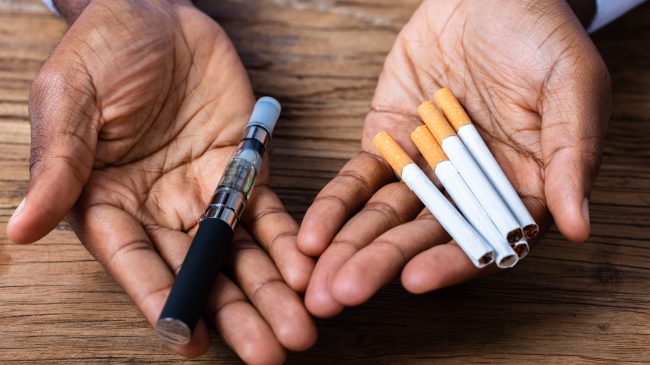Testimony Before the Maryland Senate Finance Committee on Senate Bill 177.
Chair Kelley, members of the committee, thank you for allowing me the opportunity to submit testimony on Senate Bill 177.
My name is Guy Bentley, and I’m the director of consumer freedom at the Reason Foundation, a 501(c)3 nonprofit think tank. The consumer freedom project analyzes and promotes policy solutions that improve public health while avoiding unintended consequences and protecting consumer choice.
The intention behind SB 177 to reduce tobacco use, especially among youth, is to be applauded. However, the evidence for the success of such prohibitions should give rise to significant concern that the ban will promote further inequalities in the criminal justice system, push revenue to other states, increase the illicit tobacco trade, and fail to improve public health.
Case Study: Massachusetts
Massachusetts’ ban on flavored tobacco products came into effect in June last year. From June-to-November 2020, Massachusetts’ cigarette excise tax stamp sales fell 24 percent. Unfortunately, sales in neighboring Rhode Island and New Hampshire rose 18 and 29.7 percent, respectively, compared to the same period in 2019.
Massachusetts lost $62 million in cigarette excise tax revenue while Rhode Island and New Hampshire gained $14 million and $28.5 million in cigarette tax revenue, respectively. These figures underestimate the total losses because they do not account for lost sales of flavored e-cigarettes, smokeless tobacco, or cigars. Total cigarette sales increased in New Hampshire by 46 percent, and menthol sales rose by 90 percent. Total cigarette sales in Rhode Island rose 20 percent, and menthol cigarette sales climbed by 29 percent.
According to the Tax Foundation, the flavored tobacco prohibition could cost Massachusetts a total of $120 million in the 2020-2021 fiscal year. Combining the increase of non-flavored cigarette sales in Massachusetts, which amounts to 15 percent, with the rising cigarette sales in Rhode Island and New Hampshire, cigarette sales are up overall since the prohibition came into effect. Maryland already suffers a significant trade in illicit tobacco products, with around one in 10 cigarettes being the result of evasion or avoidance. A prohibition of flavored tobacco products would significantly add to this number.
Public Health and Disparate Impacts
Advocates for the prohibition of menthol cigarettes correctly observe a disproportionate number of black smokers choose a menthol product, with around 85 percent using menthol. It’s hoped the ban will dramatically reduce the black smoking rate. While black smokers are more likely to use a menthol product and white smokers a non-menthol product, smoking prevalence is, in fact, lower among black youth and adults.
In 2019, the latest year for which we have data, Maryland’s white adult smoking rate was 14.1 percent. The black smoking rate was 12.6 percent. As for youth for whom SB 177 is primarily targeted, Maryland mirrors the national picture. Maryland’s black youth are less likely to smoke than their white peers, at 3.3 percent and 5.4 percent, respectively. These data conformed to Reason Foundation’s work last year, showing that states with higher menthol cigarette distribution rates, such as Maryland, tend to have lower, not higher, youth smoking rates.
In terms of marijuana consumption, which is illegal for recreational use in Maryland, both black and white youth use at similar rates at 17.9 percent and 18.7 percent, respectively. Prohibition has not prevented youth marijuana use, but the smoking prevalence of legal products such as cigarettes has been reduced dramatically thanks to public health information campaigns and age of purchase laws. From a public health standpoint, as black adults and youth smoke at lower rates than whites, it’s hard to ascertain why non-menthol cigarettes, which are equally dangerous, will not be subjected to prohibition and menthol products will be.
Criminal Justice
Because menthol cigarettes are overwhelmingly the choice of black smokers, this product’s prohibition will necessarily lead to a concentration of the illicit tobacco market in the black community. While the use of such products will not be prohibited by SB 177, effectively enforcing a ban on their sale and trade will entail more interactions between the police and the public.
When Congress debated the merits of a tobacco flavor ban last year, the American Civil Liberties Union and other civil rights groups warned prohibition could disproportionately impact people of color, trigger criminal penalties, and prioritize criminalization over public health and harm reduction.
The National Organization of Black Law Enforcement Executives (NOBLE), Grand Council of Guardians (GCGNY), National Association of Black Law Enforcement Officers (NABLEO), and Law Enforcement Action Partnership (LEAP) have argued that prohibitions of all kinds disproportionately affect communities of color and that in the case of menthol cigarettes it’s truer than most.
The prohibition of marijuana has disproportionately affected communities of color despite the fact there is no difference in prevalence between blacks and whites. With such a disparity in the use of menthol products, despite there being no difference in the overall smoking rate, it’s difficult to conclude this pattern will not be repeated.
Thank you again for the opportunity to comment on SB 177, and please do not hesitate to reach out if we can provide additional information or insights on this subject.

